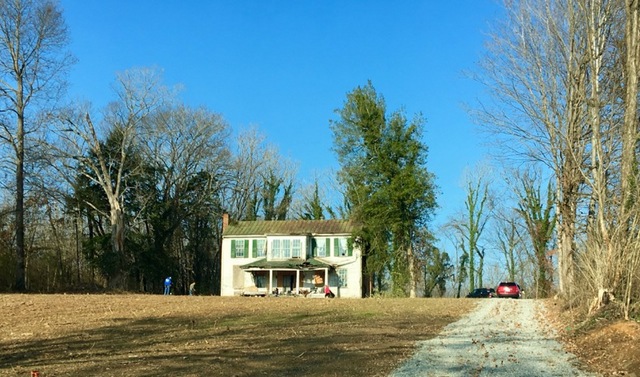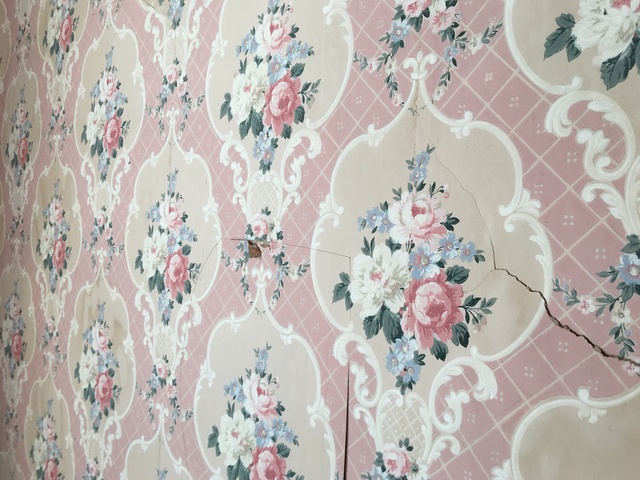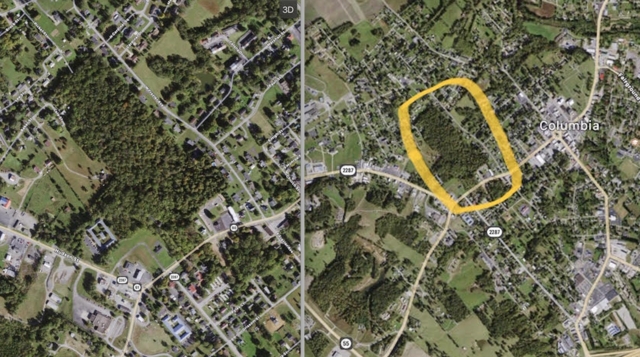| ||||||||||
Dr. Ronald P. Rogers CHIROPRACTOR Support for your body's natural healing capabilities 270-384-5554 Click here for details 


Columbia Gas Dept. GAS LEAK or GAS SMELL Contact Numbers 24 hrs/ 365 days 270-384-2006 or 9-1-1 Call before you dig Visit ColumbiaMagazine's Directory of Churches Addresses, times, phone numbers and more for churches in Adair County Find Great Stuff in ColumbiaMagazine's Classified Ads Antiques, Help Wanted, Autos, Real Estate, Legal Notices, More... 
|
History: Background of historic Hurt-Foust property By Mike Watson The City of Columbia is embarking on a major adventure with the purchase of an historic property, commonly called the Hurt-Foust Home. The property in question had been in the Hurt family since the late 1800s. This stately, antebellum structure was erected about 1854 or 1855 by Thomas H. Frazer when he was quite a young man. Within two years he sold the property, likely making a handsome profit, to Timoleon Cravens, a well-known attorney and a motivating figure in local, state, and eventually national Democrat political circles. Timoleon Cravens died suddenly in 1866 leaving his wife and children to reside here, which they did for some time. He lost the house to the Bank of Columbia for gambling debts, but held onto enough of the property to build the yellow house, at the bottom of the drive, now owned by Chuck Rogers. Cary Chandler Hurt purchased the home from the bank and stated 'Well, Rollin and I have to have a place to live if we are going to marry.' It was always speculated she sold the 'Hurt Diamond' and purchased the home and property for $2000 in 1893. Eventually the home was purchased by Judge Rollin T. Hurt and remained in the hands of his descendants until recently. Rollin Hurt was a grandson of pioneer William Hurt, son of Young E. Hurt, and father of Ralph Hurt, grandfather of Pamela Hurt Foust. The Civil War actions of south-central Kentucky greatly affected Columbia and Adair County. Columbia was on the routes from the Cumberland River to the railroad and Union holdings at Lebanon, Marion County, passing through Campbellsville, and from Somerset and Glasgow. Civil War actions in town and in close proximity to the Cravens home and property are still spoken of to this day. July 3, 1863 was momentous here, being the day Confederate John Hunt Morgan's force came through Columbia bound for the north, and the Battle at Tebbs Bend which would take place the next day, July 4th, that coincided with events that changed the War's trajectory. Judge Herschel Clay Baker, then a young man, and lived in the home adjacent to the Cravens property, wrote in 1898 of the skirmish that took place on Burkesville Street, in front of the two stately homes: "I remember one day walking up home in company with Col. Tim Cravens; he remarked to me, 'we will have Confederate troops here very soon, and I asked him why he thought so. He said, 'I just feel that way--something in the condition of the atmosphere makes me think so.'" Before two hours passed the first of the actions began in Columbia. Confederate and Union soldiers were coming upon the town from different directions and Baker observed their progress, powerless to act. With the opening shots, men on both sides were dodging bullets, the Confederates in the best positions. Baker continued, "Some of the Federal soldiers took position behind or near the Cravens residence, and after some time I noticed one or two of them creeping cautiously under my window and across the yard..." A Union "officer...between the fires, rode quietly along in the middle of the road apparently indifferent to the danger. I expected every second to see him fall from his horse, as he was riding directly up to the Confederate line and was in easy range, and I would have been glad to warn him of his danger, but I could not do so, as the balls were whizzing in both directions, and he was beyond the reach of my voice." "...He had gone probably half way from my front gate to the top of the hill when I heard a yell, the like of which I had never heard before and never expect to hear again...it was the Confederate war cry when advancing to battle--and at the same time I saw the line of soldiers as they dashed over the brow of the hill, and their shout seemed to extend from the Glasgow road around to the Crocus road." "...one of the soldiers who had passed under the window was lying out near a side gate with a shattered leg which had to be amputated--three or four Confederates, who had been killed in the fight, were lying by the road on some boards which had been provided, and when I reached town, I learned that Capt. Jesse Carter, of Wolford's Cavalry, was shot through the body and was in a room at the hotel dying." [Captain Jesse M. Carter, Captain of Company J, 1st Kentucky Volunteer Cavalry, under Colonel Frank Lane Wolford, was a native of Cumberland County, and died the day he was wounded, July 3, 1863.] The dead and wounded were laid upon the porches of the Cravens house. The Presbyterian Church may have been used on that occasion as well, but certainly was used as a hospital throughout much of the War, as was the old Baptist Church, and other sites around Columbia. Timoleon Cravens and John Hunt Morgan were friends and Morgan used the Cravens home on more than one occasion as a temporary headquarters, with is personal guard and other troops camping on the acreage behind the house. There are many stories of the activities during this period that may be brought to light at a later date. Cravens was a gifted attorney, served in the Kentucky House of Representatives, served as an officer in the local and state Democrat party, was appointed Presidential Elector in 1856, declined to run for Congress in 1859, was again a Presidential Elector in 1860 casting his ballot for Kentucky's John C. Breckinridge. Cravens died suddenly in 1866 and was buried in the Columbia Cemetery, he was 42 years of age. This property came into the possession of Judge and Mrs. Rollin T. Hurt and he made it his headquarters for the rest of his life. Mrs. Hurt, Rollin, her mother and step-father lived in the home, until each of their deaths. Ralph, and his wife, Rosebud, lived in the home, after their marriage in 1932, and then after the birth of their daughter Pamela. A member of the Hurt family resided in the home until 2014, and sadly, it was sold in 2016. So, for over 124 years, it was in the Hurt-Foust family home. Judge Hurt, who wore many hats during his decades of public life, was known as a first rate orator and as a teenager was besting grown men who were seasoned public speakers, lawyers, and politicians. Working numerous jobs in his younger years, he practiced law in Columbia for many years, held numerous offices, in particular Judge on the Kentucky Court of Appeals. He was known far and wide as a fair and experienced lawyer, defended as well a prosecuted before the bar at Columbia, every surrounding county, and across the state. Judge and Mrs. Hurt maintained and loved the house on Burkesville Street during their lives and passed that love on to their son, Ralph Hurt. Ralph Hurt practiced law with his father, and was Mayor of Columbia during a progressive move to bring the town into the new century. He and his wife, Rosebud, were great supporters of the charitable and benevolent groups of the town of Columbia and encouraged youngsters to do their best for themselves, their families, and society in general. They were the parents of Pam Hurt Foust, the latest occupant of the historic Burkesville Street home known as the Hurt-Foust House. This story was posted on 2019-12-09 15:52:54
Printable: this page is now automatically formatted for printing.
Have comments or corrections for this story? Use our contact form and let us know.
More articles from topic Mike Watson - History:
Adair County's one- and two-room schools Genealogy meeting same day, 2 Dec 2019, new time History Monday: A Thanksgiving Proclamation, 1864 Mike Watson: History Monday History: James P. Ellis, James B. White HISTORY: Wife Killing Results In Conviction HISTORY MONDAY: Education, Business and Politics Letter: The difficulty of Field identification Big Business on the River Mike Watson: Restoration in Action--Volunteers Needed View even more articles in topic Mike Watson - History |



|
||||||||
|
| ||||||||||
|
Quick Links to Popular Features
Looking for a story or picture? Try our Photo Archive or our Stories Archive for all the information that's appeared on ColumbiaMagazine.com. | ||||||||||
|
Contact us: Columbia Magazine and columbiamagazine.com are published by Linda Waggener and Pen Waggener, PO Box 906, Columbia, KY 42728. Please use our contact page, or send questions about technical issues with this site to webmaster@columbiamagazine.com. All logos and trademarks used on this site are property of their respective owners. All comments remain the property and responsibility of their posters, all articles and photos remain the property of their creators, and all the rest is copyright 1995-Present by Columbia Magazine. Privacy policy: use of this site requires no sharing of information. Voluntarily shared information may be published and made available to the public on this site and/or stored electronically. Anonymous submissions will be subject to additional verification. Cookies are not required to use our site. However, if you have cookies enabled in your web browser, some of our advertisers may use cookies for interest-based advertising across multiple domains. For more information about third-party advertising, visit the NAI web privacy site.
| ||||||||||



















































